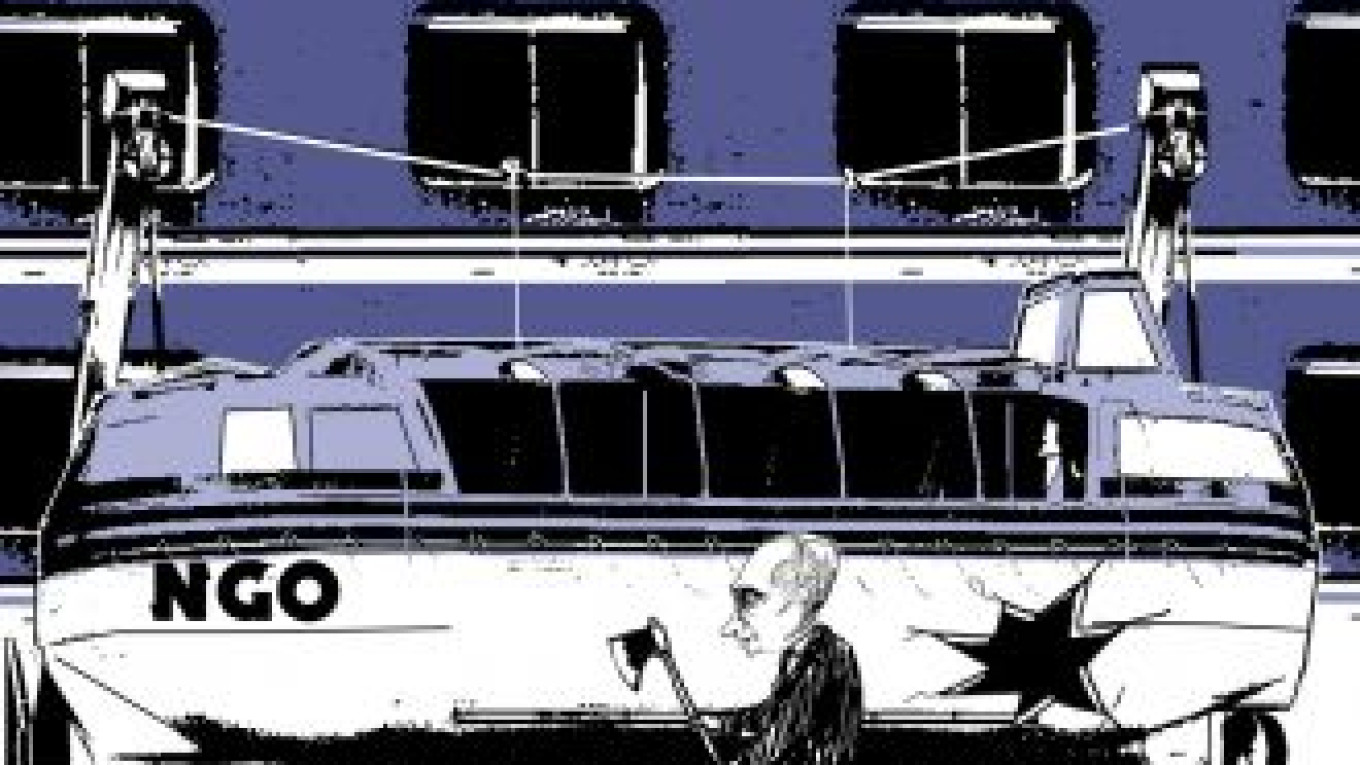For the last nine years, President Vladimir Putin has hosted the Valdai International Discussion Club, devoting time and attention to leading Russia experts from around the world. Putin's interest in these discussions suggests that he is open to alternative perspectives about Russia's development and global role. But his government's position toward nongovernmental institutions with foreign ties and foreign organizations operating in Russia raises concerns that it has lost sight of the value of international cooperation.
Since Putin first became president in 2000, Russia's political, economic and social stability has been largely restored. But while his government's policies helped to put Russia on the path to recovery, public- and private-sector entities worldwide also contributed, devoting time, energy and capital to helping Russia discard inefficient Soviet-era structures and pursue a society based on democratic principles, the rule of law and a market economy.
Their efforts bolstered Russia's transformation into a stable, prosperous and globally engaged country. Rather than pursuing their own interests, foreign-funded NGOs have largely based their actions on concern for Russia and its citizens and on the belief that what is good for Russia is good for the rest of the world. Such sentiments have guided Russia-relevant programs for decades in both turbulent and prosperous times.
Foreign entities that have made substantial investments in Russia's future include U.S. philanthropic organizations and other Western donors. These organizations have worked with Russian institutions and ministries to smooth the country's post-Soviet transition, responding to needs that Russia's citizens and leadership have defined.
For example, these foundations supported struggling Russian universities after the Soviet Union's collapse, helping them regain their status while rebuilding academic programs in all disciplines. They have supported thousands of Russian scholars, academics and scientists, enabling them to contribute to Russia's transformation, rather than having to join many of their colleagues in pursuing opportunities elsewhere.
Moreover, through research and travel grants, foreign NGOs have connected Russian intellectuals to the outside world, facilitating the linkages that are crucial in modern academic communities. They have worked with Russian civil society leaders to strengthen the country's nongovernmental sector, a basic element of a functioning democracy. What's more, they have funded programs aimed at creating and implementing effective policies to secure Russia's large nuclear arsenal at a time when the country's ability to do so was dangerously weak.
Given this legacy of heavy investment by the Western public and private sectors in Russia's future, the Kremlin's position on foreign and foreign-funded organizations seems puzzling. Several measures from the Kremlin have undermined the U.S.-Russian partnerships, including the closure of USAID in October, the passage of a law last summer forcing foreign-funded NGOs to register as "foreign agents," and the termination of the Nunn-Lugar program, which assisted Russia in destroying its old nuclear and chemical stockpiles.
Many observers are relieved that Russia no longer needs external aid to support groups and activities that previously relied on it. But the Putin government's policies do not do justice to Russia's past, present or future. Instead, they diminish recent accomplishments, negate successful partnerships and preclude the kind of international collaboration that has benefited Russia and the world.
Having presided over the country for more than a decade, Putin is in a unique position to achieve what no previous Russian leader could: making Russia part of the solution to global challenges rather than part of the problem. A self-reliant, self-confident, transparent, strong and engaged Russia is in the interest of not only the country's leaders but also the foreign-funded NGOs that have made such valuable contributions to its development.
The government's punitive approach to those who deeply care about Russia's future undermines this vision. Putin should act in the best interests of his country — and the rest of the world ?€” by establishing Russia as a positive global force that is not afraid of its foreign friends.
Deana Arsenian is vice president of the International Program at Carnegie Corporation of New York. © Project Syndicate
Related articles:
A Message from The Moscow Times:
Dear readers,
We are facing unprecedented challenges. Russia's Prosecutor General's Office has designated The Moscow Times as an "undesirable" organization, criminalizing our work and putting our staff at risk of prosecution. This follows our earlier unjust labeling as a "foreign agent."
These actions are direct attempts to silence independent journalism in Russia. The authorities claim our work "discredits the decisions of the Russian leadership." We see things differently: we strive to provide accurate, unbiased reporting on Russia.
We, the journalists of The Moscow Times, refuse to be silenced. But to continue our work, we need your help.
Your support, no matter how small, makes a world of difference. If you can, please support us monthly starting from just $2. It's quick to set up, and every contribution makes a significant impact.
By supporting The Moscow Times, you're defending open, independent journalism in the face of repression. Thank you for standing with us.
Remind me later.


